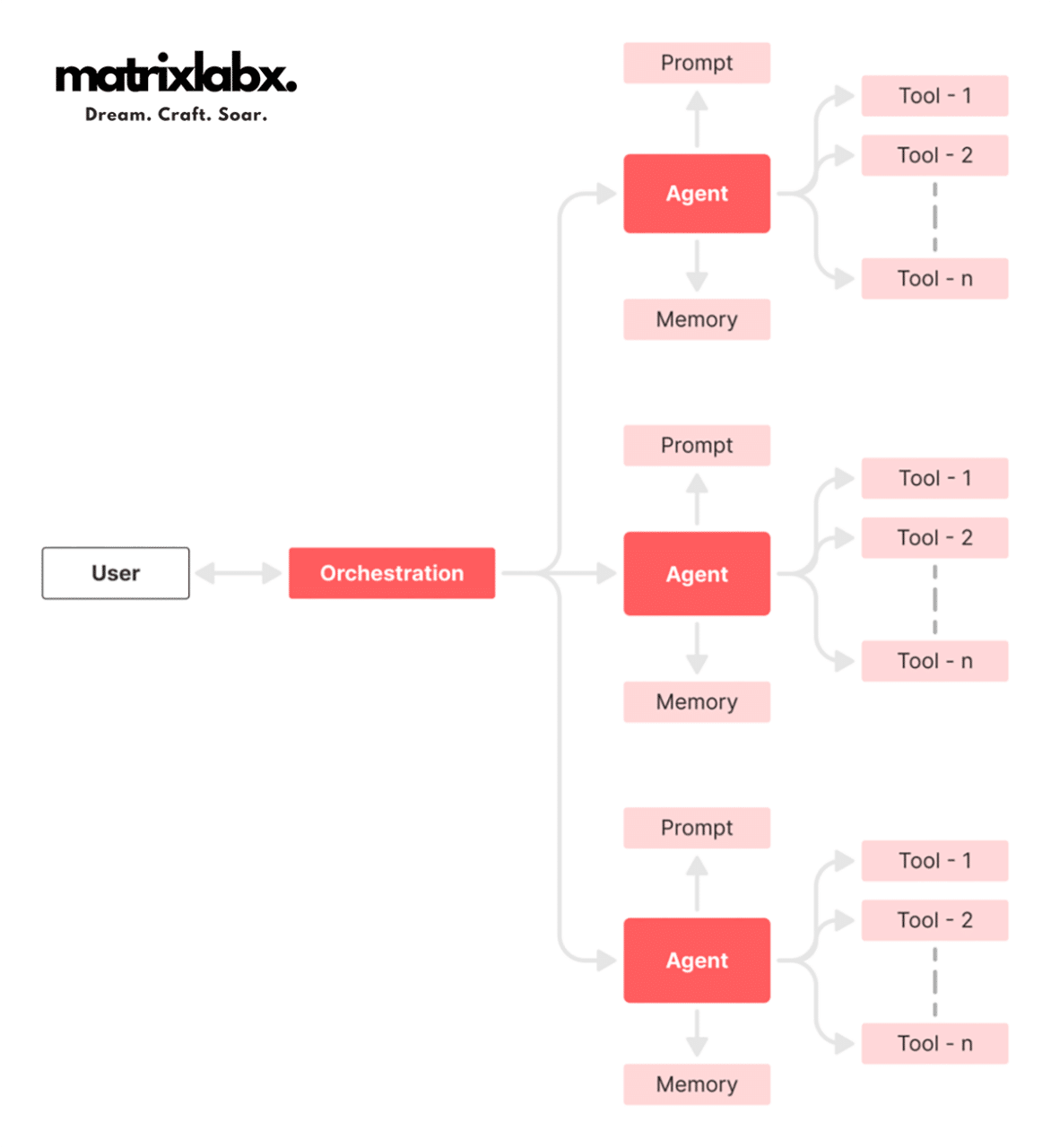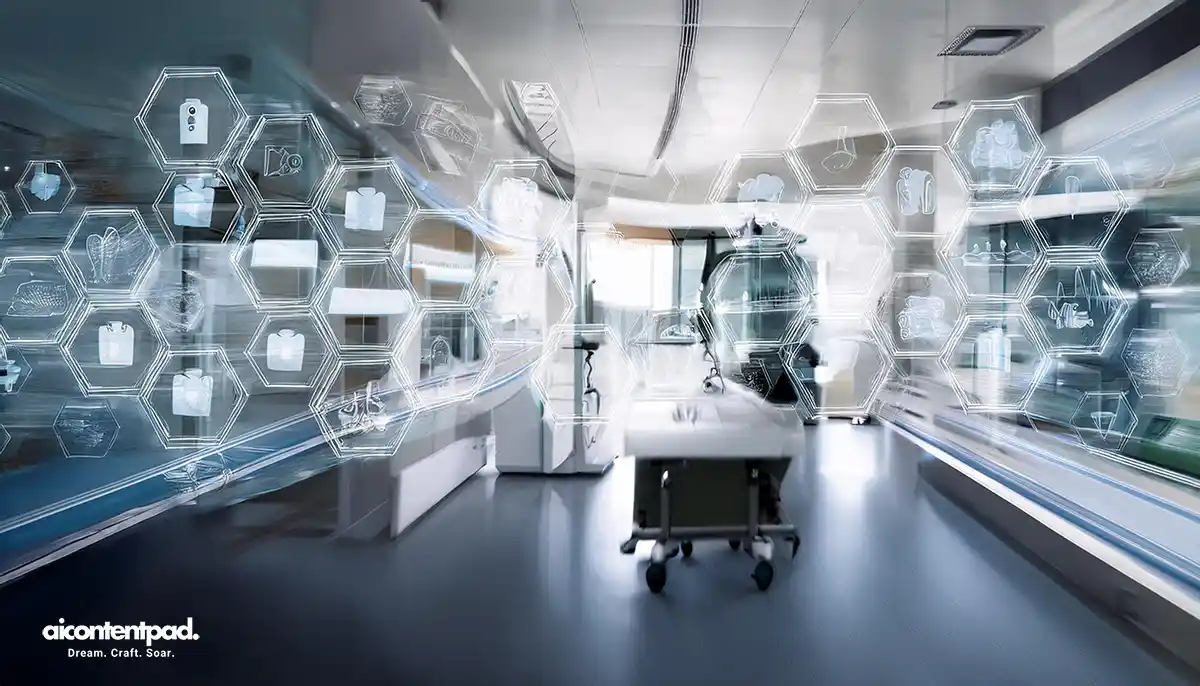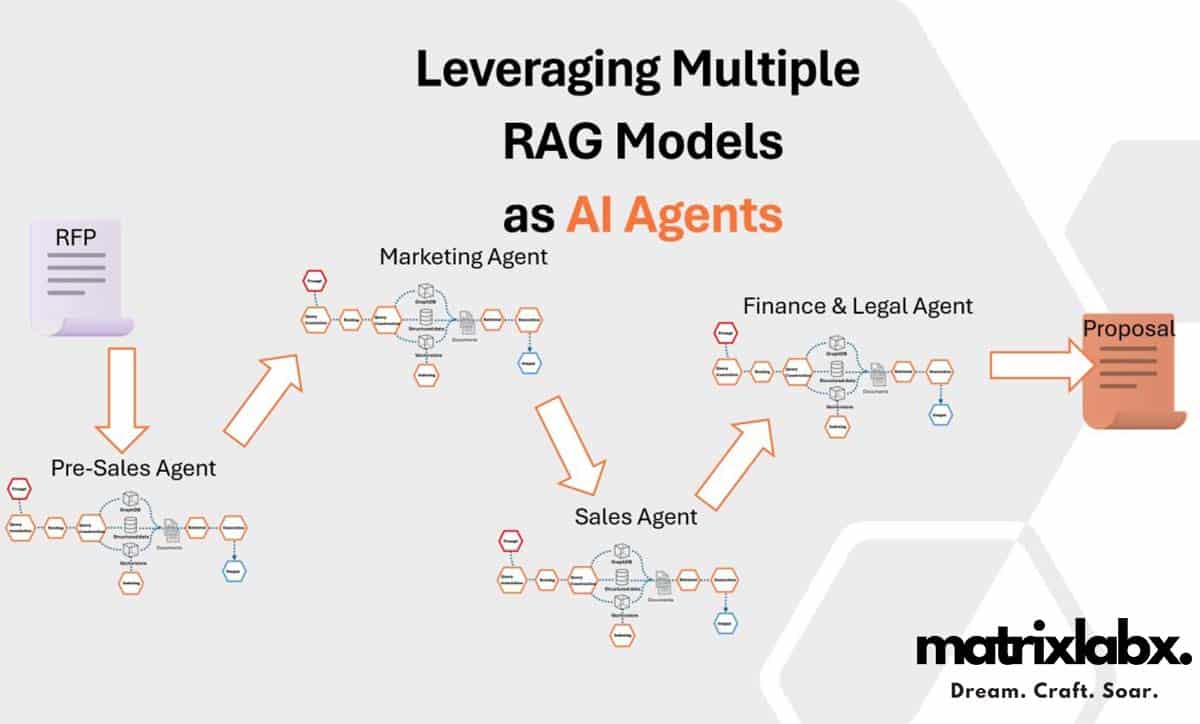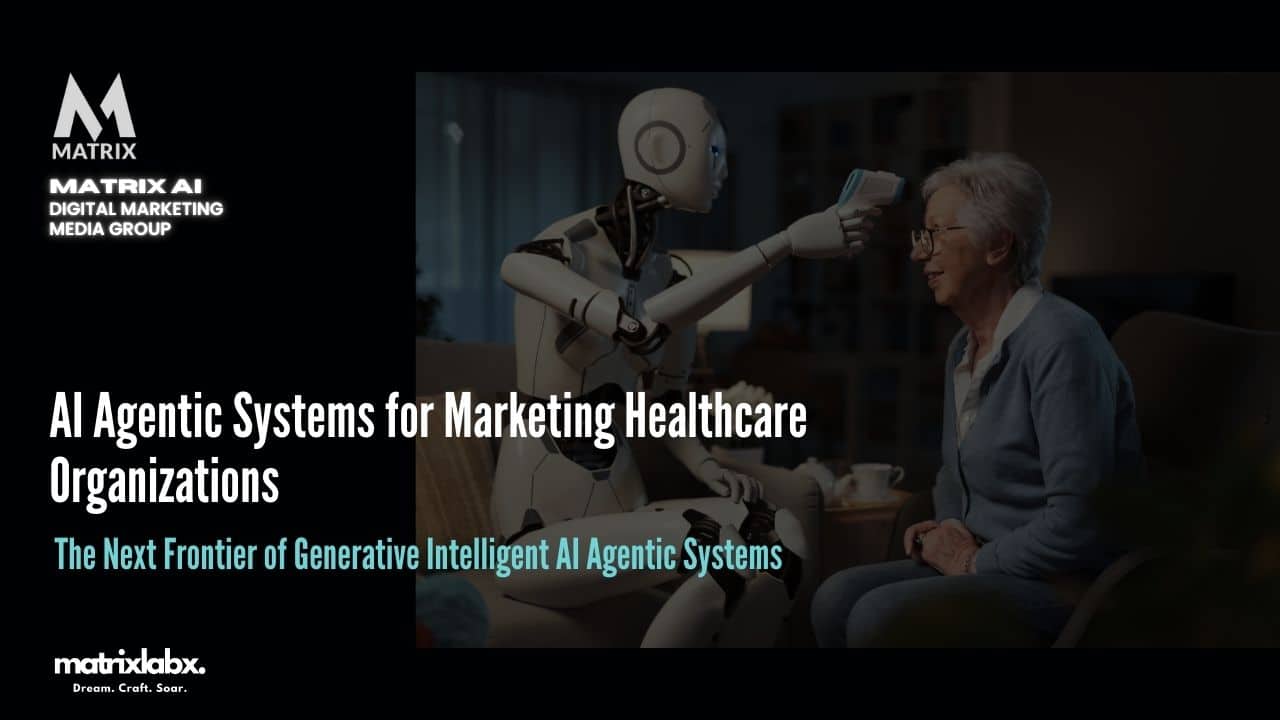AI Agentic Systems for Marketing Healthcare Organizations: A Guide for Chief Marketing Officers
Learn About AI Agentic Systems for Marketing Healthcare Organizations: A Guide for Chief Marketing Officers.
Imagine AI agentic systems for marketing healthcare organizations as a personalized GPS for patient engagement. Just like a GPS helps drivers navigate complex routes by continuously updating based on real-time conditions, AI agentic systems adapt to the dynamic needs of healthcare marketing, guiding CMOs through intricate patient journeys with real-time adjustments.
This system constantly learns from each “roadblock” (regulations, patient privacy needs) and “traffic pattern” (shifts in patient behavior) to provide the most efficient route toward engagement and patient satisfaction.
Now, consider the empathy map of a chief marketing officer (CMO) in a midsize B2B organization:
- The CMO wants to provide value by understanding the customer’s journey, especially when it’s complex. AI agentic systems can empathize more deeply with patients as “customers,” understanding their needs, preferences, and challenges in real-time—without sacrificing compliance.
- CMOs constantly hear about rising demands for data-driven, customer-centric marketing. They know that effective marketing now relies on technology to stay responsive. Agentic systems act as responsive “ears on the ground,” gathering feedback directly from patient interactions to adapt marketing messages accordingly.
- The CMO sees a maze of regulatory requirements, competition, and a rapidly evolving market. AI agentic systems serve as a proactive tool to cut through the noise and simplify the path, keeping all moving pieces in alignment while ensuring they stay compliant and up-to-date.
- CMOs advocate for efficiency, innovation, and customer satisfaction. By adopting agentic AI, they don’t just talk about these ideals—they implement them. The system’s ability to predict and personalize allows them to act on insights rather than intentions, making campaigns truly impactful and patient-centric.
- The CMO feels the pain of balancing resources, budgets, and patient needs in a sector where mistakes carry high costs. AI agentic systems alleviate this pain by automating routine tasks, ensuring compliance, and enabling targeted, efficient patient outreach that optimizes resources.
- The CMO’s ultimate gain is improved patient engagement and loyalty. Agentic systems facilitate this by creating a seamless, trustworthy experience that patients can rely on, turning AI-driven insights into meaningful, empathetic connections with each patient.
AI agentic systems are like GPS and have empathy for healthcare marketing.
They guide CMOs in a midsize B2B organization by delivering real-time patient insights, adapting to the regulatory landscape, and focusing on empathy-driven engagement. They help CMOs bridge the gap between technical capabilities and human-centered marketing.
Integrating Artificial Intelligence (AI) in healthcare marketing is reshaping the industry, making it essential for chief marketing officers (CMOs) to explore new technologies to remain competitive.
AI Agentic Systems—self-learning, adaptive platforms designed to mimic human decision-making—transform how healthcare organizations interact with patients and manage their marketing efforts.
Understanding and deploying these systems can offer healthcare CMOs a critical edge in a sector characterized by high regulation, diverse patient needs, and stringent data privacy requirements.
This article offers insights into AI agentic systems and their applications and actionable guidance on implementing them to enhance engagement, personalization, and efficiency.
Artificial Intelligence (AI) agentic systems are revolutionizing marketing strategies within the healthcare sector. These systems, characterized by their autonomous decision-making and adaptive learning capabilities, are enhancing patient engagement, optimizing marketing operations, and providing data-driven insights. This analysis delves into the latest trends, technologies, and challenges associated with AI agentic systems in healthcare marketing, supported by statistics, case studies, and expert opinions.
Empowering Intelligent Marketing with Multi-Agent RAG Systems
A New Era of AI with Matrix Marketing Group and MatrixLabX
Matrix Marketing Group, in partnership with MatrixLabX, is redefining the future of marketing through next-generation AI capabilities powered by Multi-Agent RAG Systems. This revolutionary approach elevates traditional AI, providing brands with an adaptable, deeply intelligent system for solving marketing challenges and seizing opportunities. Learn more.
1. Trends in AI Agentic Systems for Healthcare Marketing
- Personalization and Patient Engagement: AI agentic systems enable highly personalized marketing efforts by analyzing patient data to tailor communications and services. This personalization leads to improved patient engagement and satisfaction. For instance, AI-driven predictive analytics allow marketers to anticipate patient behaviors and health trends, facilitating strategic outreach initiatives.
- Predictive Analytics: These systems use predictive analytics to forecast patient needs and behaviors, allowing healthcare organizations to address patient concerns and optimize marketing strategies proactively. AI’s capability to process and interpret vast amounts of data from diverse sources enables marketers to predict future patient behaviors and health trends, marking a substantial breakthrough in healthcare marketing.
- Automation of Marketing Processes: AI agentic systems automate routine marketing tasks, such as content creation, email campaigns, and social media management, increasing efficiency and reducing operational costs. For example, generative AI tools like Typeface Arc manage entire marketing campaigns by learning from historical data to generate content for multiple channels tailored to specific marketing objectives.
- Integration with Multi-Agent Systems: Adopting multi-agent systems allows for coordinating various AI agents to handle complex marketing tasks, enhancing scalability and adaptability. These systems consist of individual AI agents that operate independently yet collaboratively, each tasked with specific objectives, such as tracking patient behavior, segmenting demographics, or automating responses, and enhancing the overall marketing strategy.
2. Technologies Driving AI Agentic Systems in Healthcare Marketing
- Natural Language Processing (NLP): NLP enables AI systems to understand and generate human language, facilitating more natural and effective patient interactions. This technology is crucial for developing AI-powered chatbots and virtual assistants that provide patients with 24/7 access to information, answer queries, and offer personalized health advice, improving patient satisfaction and loyalty.
- Machine Learning and Deep Learning: These technologies allow AI systems to learn from data and improve over time, enhancing their ability to predict patient behaviors and preferences. For example, AI agents can analyze vast amounts of medical data quickly and accurately, providing insights that human eyes might miss. Thus, they transform how diseases are diagnosed, treatment plans, and patient care are managed.
- Multi-Agent Frameworks: These frameworks enable the development of systems where multiple AI agents work collaboratively to achieve marketing objectives, such as segmenting audiences or predicting patient behavior. This approach enhances the overall marketing strategy by allowing each agent to operate independently yet collaboratively, handling specific tasks like tracking patient behavior, segmenting demographics, or automating responses.
3. Challenges in Implementing AI Agentic Systems in Healthcare Marketing
- Data Privacy and Compliance: Compliance with regulations like the Health Insurance Portability and Accountability Act (HIPAA) is critical when handling patient data. AI systems must be designed to protect patient privacy and maintain confidentiality. Agentic AI systems must adhere strictly to these standards, as data privacy compliance is not optional in healthcare marketing.
- Integration with Existing Systems: Seamlessly integrating AI agentic systems with current marketing infrastructure, such as Customer Relationship Management (CRM) and Content Management Systems (CMS), can be complex and requires careful planning. A phased integration approach, starting with pilot testing and followed by gradual system integration, ensures seamless operations and prevents disruptions in patient communications.
- Ethical Considerations: Maintaining transparency and avoiding biases in AI decision-making processes are essential to uphold patient trust and ensure ethical marketing practices. CMOs must ensure that agentic systems maintain transparency and ethical standards, avoiding automation pitfalls that can alienate patients.
4. Case Studies and Expert Opinions
- Case Study: National Australia Bank (NAB): NAB reported a 40% increase in customer engagement following the launch of its AI tool, the “customer brain. ” This tool uses machine learning to analyze customer habits and anticipate their needs, significantly improving customer interactions by making communications more relevant.
- Expert Opinion: IBM on Agentic AI: IBM highlights that agentic AI brings together the versatility and flexibility of large language models (LLMs) and the precision of traditional programming, enabling systems to autonomously perform tasks on behalf of a user or another system by designing its workflow and using available tools.
II. Understanding AI Agentic Systems

Definition and Core Principles AI agentic systems are advanced forms of AI built on self-learning and adaptive algorithms capable of making independent, data-driven decisions.
Unlike traditional AI tools that rely on pre-defined rules, agentic systems use multi-agent frameworks, neural networks, and real-time data to evolve their responses to patient and market needs continuously.
Key Features of Agentic AI in Marketing
- Self-Learning Capabilities: Agentic systems learn from each interaction, enabling them to refine patient engagement strategies over time.
- Adaptive Decision-Making: These systems react dynamically to changing patient behaviors and preferences.
- Data-Driven Insights: Agentic AI relies on extensive data processing, enabling the extraction of actionable insights for personalized and efficient marketing.
Relevance to Healthcare Marketing Healthcare marketing faces unique challenges, such as ensuring HIPAA compliance and maintaining patient trust.
Agentic AI systems address these by enabling personalized outreach and adapting to real-time compliance requirements. For CMOs, this translates to more effective patient engagement while staying within regulatory guidelines.
On average, companies spend $5,000 to $20,000 monthly on content marketing—including blogs, videos, social media, and more—but only 35% of marketers feel they are successfully managing these efforts efficiently. Get Instant Pricing.
III. Key Benefits of AI Agentic Systems in Healthcare Marketing
Enhanced Customer Engagement Agentic systems elevate the patient experience by tailoring interactions based on individual patient data.
They improve the patient journey through highly personalized communications by predicting needs and preferences.
For example, an agentic system can deliver tailored content to patients about preventive care or medication reminders, significantly improving engagement rates.
Data-Driven Decision Making Agentic AI gives CMOs in-depth insights into patient behaviors, preferences, and concerns. These insights allow for real-time monitoring and fine-tuning of marketing strategies.
Tools within agentic systems also provide feedback mechanisms, enabling CMOs to track the impact of their campaigns and continuously adjust messaging.
Cost Efficiency and Marketing ROI AI agentic systems can significantly reduce marketing costs by automating routine tasks, such as follow-up reminders and patient segmentation.
With automated decision-making and predictive analysis, healthcare organizations can optimize resources, leading to measurable cost savings and improved ROI.
Scalability and Adaptability: Agentic AI systems are designed to adapt and scale across various channels, from email and SMS to social media and healthcare portals.
This scalability enables CMOs to broaden their reach efficiently, keeping up with rapid changes in patient expectations and regulatory updates.
IV. The Architecture of AI Agentic Systems

Key Components An agentic system for healthcare marketing comprises several core components:
- Multi-Agent Frameworks: Multiple agents work collaboratively to achieve specific marketing goals, such as segmenting audiences or predicting patient behavior.
- Neural Networks mimic human neural pathways to analyze vast amounts of patient data.
- Decision-Making Algorithms: These ensure the AI system can make informed, compliant decisions based on real-time data.
MatrixLabX as a Model MatrixLabX has created a robust model for agentic systems, providing a real-world case study on deploying this technology.
Its architecture aligns with healthcare CMOs’ needs by integrating machine learning with healthcare CRM systems, making patient engagement more data-driven and efficient.
Integration with Existing Marketing Infrastructure For CMOs, aligning agentic systems with existing platforms like CRMs, CMS, and analytics tools is critical.
A phased integration approach, starting with pilot testing and followed by gradual system integration, ensures seamless operations and prevents disruptions in patient communications.
V. Multi-Agent Systems in Healthcare Marketing

What are Multi-Agent Systems? Multi-agent systems consist of individual AI agents that operate independently yet collaboratively.
Each agent is tasked with specific objectives—such as tracking patient behavior, segmenting demographics, or automating responses—that enhance the overall marketing strategy.
Applications in Healthcare
- Targeted Ad Campaigns: Multi-agent systems identify patient demographics for tailored advertising, leading to higher engagement rates.
- Automated Responses: Agents handle routine inquiries, providing patients with timely and accurate information.
Examples of Multi-Agent Systems at Work Consider a healthcare organization implementing multi-agent AI to target seasonal flu vaccination campaigns.
The agents analyze patient demographics, identify high-risk groups, and generate personalized reminders.
This use case demonstrates how multi-agent systems improve engagement and optimize marketing resources.
VI. Agentic Learning for Market Adaptation
What is Agentic Learning? Agentic learning is the continuous self-improvement of AI systems in response to dynamic market environments.
In healthcare, this adaptation is crucial to meet evolving regulations and shifts in patient needs.
Benefits for Market Adaptation in Healthcare Agentic learning enables healthcare organizations to quickly adapt to new regulations, patient expectations, and competitive pressures.
CMOs benefit from ongoing optimization, as agentic learning refines marketing strategies based on real-time patient feedback.
Practical Steps for Implementing Agentic Learning
- Data Management: Establish a data management framework to support continuous learning.
- Training Protocols: Train marketing teams to interpret AI-generated insights and incorporate them into campaign planning.
VII. AI-Driven Branch Models for Healthcare Marketing
Introduction to Branch Models AI-driven branch models divide complex marketing tasks into specific, manageable segments, making them ideal for targeting individual patient needs within healthcare.
Branch Models for Personalized Patient Outreach Branch models allow for patient-specific content delivery. For example, a healthcare organization might use branch models to provide lifestyle tips tailored to patients with chronic conditions.
Operational Efficiency and Predictive Modeling Branch models enhance operational efficiency by anticipating patient behavior and aligning resources accordingly. Predictive models can anticipate appointment scheduling demands, seasonal health patterns, or resource needs, improving patient care and resource allocation.
VIII. Challenges and Considerations for Healthcare CMOs
Data Privacy and Compliance HIPAA and other regulatory frameworks govern patient data privacy. Agentic AI systems must adhere strictly to these standards. For healthcare CMOs, data privacy compliance is not optional; agentic systems offer secure data handling and real-time adaptability to changing compliance requirements.
Change Management and Workforce Training Implementing agentic systems require buy-in from the entire marketing team. CMOs should emphasize change management, preparing teams to adapt to new workflows and interpret AI-driven insights effectively.
Ethical Considerations Ethics play a significant role in healthcare, where patient trust is paramount. CMOs must ensure that agentic systems maintain transparency and ethical standards, avoiding automation pitfalls that can alienate patients.
IX. Roadmap for Implementing AI Agentic Systems in Healthcare Marketing

Assessment and Planning
- Assess Readiness: Evaluate current marketing capabilities, data readiness, and technology infrastructure.
- Define Goals: Establish specific objectives, such as improving patient engagement or reducing marketing spend.
Phased Implementation Begin with pilot testing to identify challenges and refine processes. A phased rollout minimizes risks and allows for adjustments based on patient and organizational feedback.
Measuring Success and ROI, Key metrics include:
- Engagement Rates: Tracking patient interaction and content engagement.
- Conversion Rates: Measuring patient follow-through on campaigns.
- Cost Savings: Calculating ROI through reduced operational costs and improved resource allocation.
X. Future Trends in AI Agentic Systems for Healthcare Marketing
Emerging Technologies and Innovations As AI technologies advance, new trends such as conversational AI and augmented multi-agent systems will play a growing role. For instance, integrating conversational AI into multi-agent frameworks allows patients to interact directly with AI, receiving real-time responses.
Implications for Healthcare CMOs For CMOs, staying ahead of these trends is vital for long-term strategy. Prioritize research and investment in emerging technologies that promise greater efficiency and enhanced patient experiences.
XI. Conclusion
Summary of Key Takeaways AI agentic systems offers unparalleled opportunities for healthcare CMOs, from personalized patient engagement to predictive analytics. These systems, powered by multi-agent frameworks, branch models, and agentic learning, help healthcare organizations remain competitive in a rapidly evolving environment.
5. Future Outlook
The adoption of AI agentic systems in healthcare marketing is expected to grow, driven by advancements in AI technologies and increasing demand for personalized patient engagement.
Gartner predicts that by 2028, at least 15% of day-to-day work decisions will be autonomously through agentic AI, up from 0% in 2024. However, addressing challenges related to data privacy, system integration, and ethical considerations will be crucial for successful implementation.
AI agentic systems offer significant potential to transform healthcare marketing by enhancing personalization, efficiency, and data-driven decision-making. Healthcare organizations that effectively implement these systems can expect improved patient engagement and operational efficiency, positioning themselves at the forefront of the evolving healthcare landscape.
The transformative power of AI agentic systems lies in their ability to adapt, learn, and optimize marketing strategies. By investing in these systems, healthcare CMOs can deliver better patient outcomes while improving marketing efficiency.
Healthcare CMOs are encouraged to explore AI agentic systems strategically, ensuring they remain at the forefront of digital innovation in healthcare marketing. As these systems evolve, so will the potential for building lasting, impactful patient relationships through smarter, data-driven marketing.


